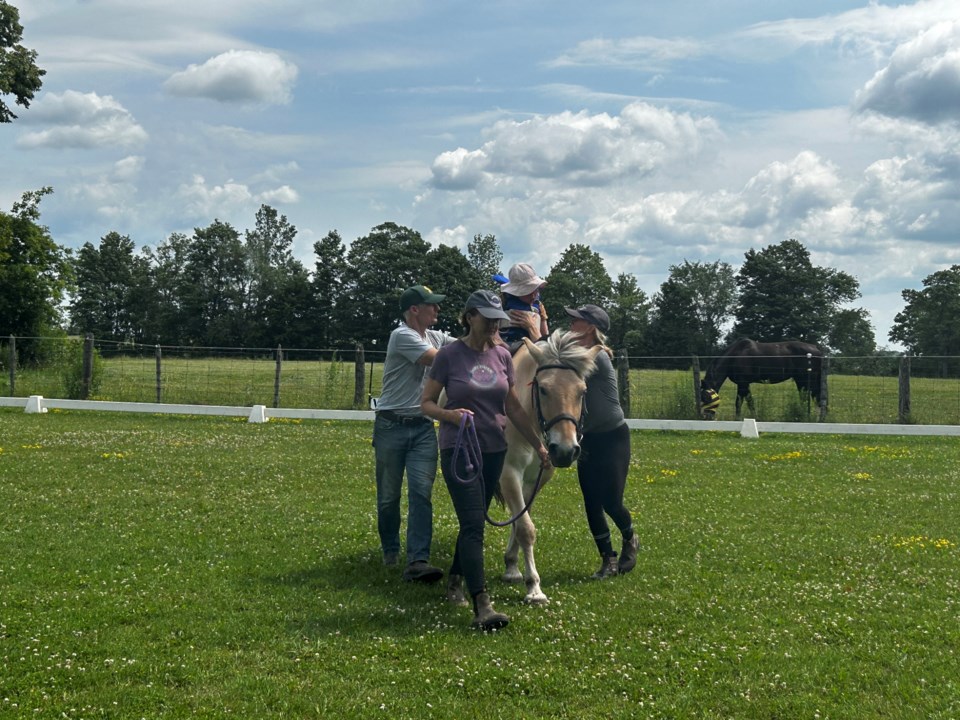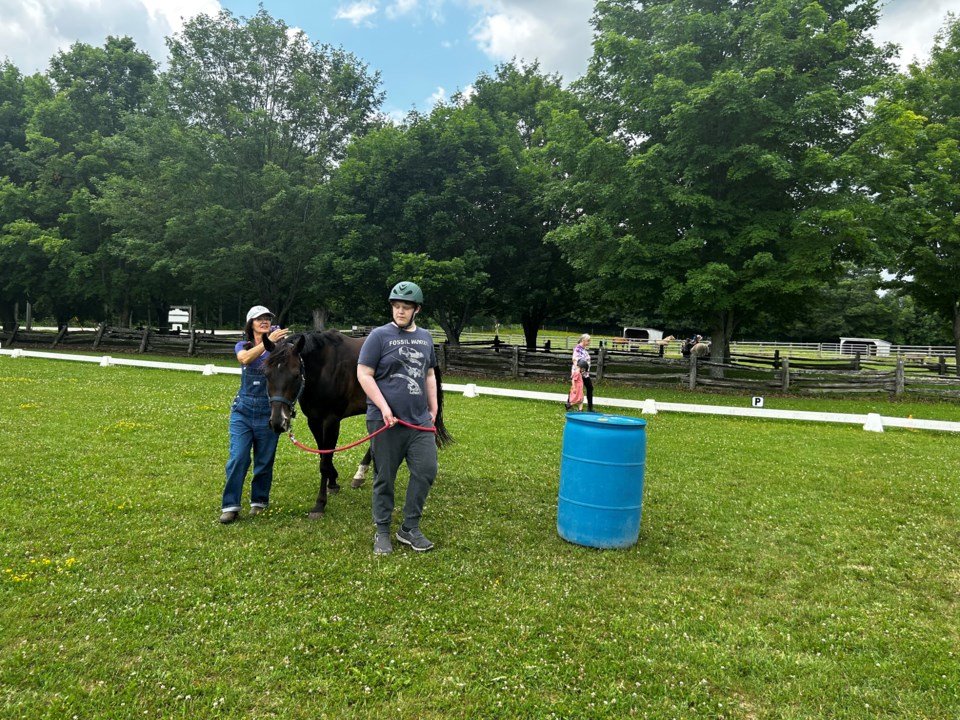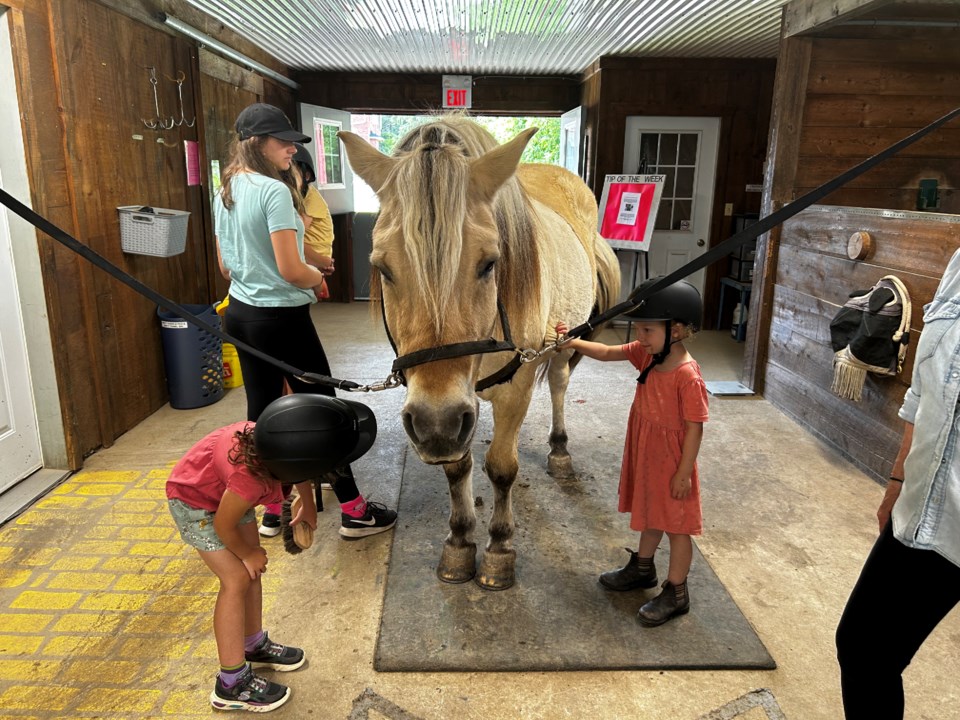High on the escarpment, down a lane lined with green, leafy branches jutting out from wide tree trunks, a child sits on a horse; four adult hands support her torso, another leads the horse at a slow walk along the fence line.
The girl can see the tops of three heads, the horse’s mane and ears. It’s a different view than she has had her seven years of life, which she spends in a wheelchair, or in the arms of her parents and grandparents.

Nobody will tell her to get down off this high horse, they want her to enjoy the view from above, want her and her parents to see what it looks like to have high hopes.
The girl is one of many children and adults whose lives are different because of genetic conditions, physical disabilities, cognitive disorders, and other diagnosed and undiagnosed conditions, and she is one of the riders at Hope Haven Therapeutic Riding Centre.
It’s at this centre in Markdale, Ont., where a team of staff and an even bigger team of volunteers use about a dozen horses to deliver programs such as adaptive riding and horsemanship, hippotherapy, Special Olympics equestrian training, and recreation therapy to individuals of all ages with disabilities or unique needs.
Benoit Dube, the centre’s executive director, said the therapy involves the physical exercise of riding a horse, which is adapted to the rider’s ability, and it also involves giving the rider and maybe their parents a little lift.
“It’s empowering too, because all of the sudden they’re sitting on top of a 1,000-pound animal that they can control, as opposed to being looked down at their whole life when they’re sitting in a chair … so we get a lot of excitement about that,” said Dube.
Kim Reain, the centre’s development officer, knows first-hand the impact the programs can have. Her daughter, Tatum, has a rare genetic disorder that has affected her physically, preventing her from walking until later in life.
Tatum also has Autism Spectrum Disorder and is non-verbal. She receives hippotherapy — physical, occupational, and speech therapy using the natural gait and movement of a horse to provide motor and sensory input — treatment and participates in the adaptive riding and Special Olympics programs.
“To watch your child, who really struggles through most days to do most normal things, sit on top of a horse and smile like you’ve never seen them before, squeal like you’ve never seen them before, and show posture you’ve never seen them have before, it just gives you the feeling that everything’s possible,” said Reain.
She has also found, at Hope Haven, other parents and caregivers she has been able to relate to and connect with on a level she doesn’t always get to enjoy.
“It’s coming to a place where I feel more normal … where I can connect with other parents who get it … life’s not perfect for any of us, but it’s particularly not perfect when you have a child who’s so different from everybody else,” said Reain.
Reain’s daughter has experienced the empowerment of being part of equestrian sports. She recently had a race with another rider, and while neither child was controlling their own horse independently, being part of the race was exciting for them.
“They were the same as each other and the same as anybody else on a horse for just a few minutes while they were doing their sport, so it’s a pretty amazing thing,” she said.
Just like the equipment, from harnesses for the child to reins for them to hold, the horses are chosen to fit the rider and the treatment or therapy they’re receiving.
There are currently 11 horses at Hope Haven being used for the therapeutic riding programs, and typically there are about 15 horses in the rotation. However, finding a horse at an affordable price for their programs has become more difficult over the last few years, said Dube.

The horses get exercise outside of their work at the centre, which is mentally demanding for a horse but not quite physically demanding enough to keep them strong and healthy.
The horses of Hope Haven arrived well-trained, typically as school horses. They get more training at Hope Haven, specific to the therapy they will be helping with.
“It doesn’t matter how much training they have when they get here, their new job is a little different,” said Dube, who has been involved with the centre since 2017 as a volunteer and then became executive director in 2018.
Some of the training would involve getting the horse used to people walking beside them and leaning on them while there is a rider on their back. Hope Haven also does use props and toys to help kids with coordination and movement, so the horses have to be introduced to those objects.
Some horses might not have seen a wheelchair before, but Hope Haven has its riders learn about grooming as much as possible, so there are some riders who are brushing the horse from a wheelchair or while using a walker.
Fred, the oldest horse on the team, serves as the centre’s unofficial mascot. A stoic, calm, and fuzzy Norwegian Fjord that once worked as a carthorse and now helps Hope Haven’s program participants learn about ground work.
He stands in the crossties patiently letting children poke him with brushes until they learn the technique for horse grooming. He’ll follow a tentative child slowly around a barrel, being careful not to step on any toes.
Head of the four-legged team is Red, a ginger cat known for supervising staff and socializing clients, but never for mouse hunting.
Dube has tested Red’s mouse-hunting skills by introducing the cat to a mouse in a box. The cat delegated the task to the dog.
Hope Haven became a therapeutic riding centre in 2010 and a registered charity in 2014.
There are between 60 to 70 riders a week at Hope Haven signing up for the 12-week session, plus about 48 kids per week from school plus summer camps.
“Altogether it’s about 110 to 130 kids per week coming through here for our programs,” said Dube.
But that’s mostly seasonal, with winter being the slow season.
There are summer camps at Hope Haven where participants learn about horses, how to take care of horses and how to feed them. They won’t ride horses, but they learn how to groom horses and lead them through a course.
Caring for horses and working with a horse outside of the riding session are both priorities that Hope Haven tries to involve participants in where possible.
“A lot of the therapeutic riding facilities don’t expect their riders to actually connect with the horse in that way and care for them, but we do,” said Reain.
Hope Haven is currently building a second riding arena as the waiting list and demand for their programs increases. A second arena also allows more programming when the weather doesn’t permit outdoor riding.
“What we’re hoping to do with this new facility is add programs – equine-facilitated learning and equine-facilitated therapies,” said Reain.
The arena and all of the facilities and programs at Hope Haven are funded through grants and donations from organizations and individuals, many of whom are recognized inside the barn at the centre.
“We rely heavily on volunteers and also on donors, this is a charitable organization, so basically we run because of generosity of humans, their time as well as their money,” said Reain.
The centre is looking for both volunteers and supporters to join their work.
Hope Haven will be hosting its first annual hoedown fundraiser in September, featuring live music by Fiddlestix, dancing, line dancing lessons, dinner and a silent auction. The event will take place Sept. 16 from 6 p.m. to 11 p.m. and tickets are now on sale online here.



